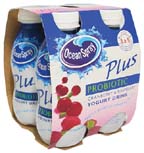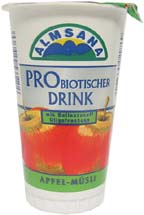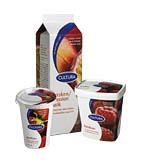

Within the past year, the all-American cranberry has become much more for folks overseas thanks to U.K.-based Ocean Spray International, a company that has been able to expand beyond juice and enter the dairy market. Packages of new Ocean Spray® Plus Probiotic Yogurt Drink boldly state that the beverage contains Lactobacillus acidophilus La-5, Bifidobacterium bifidum BB12 and fruit juice. The product is described as a combination of the natural goodness of cranberries with bio cultures for a positive balance of friendly bacteria in the digestive system.
French firm Group Danone recently launched a novel probiotic dairy concept in Belgium called Zen. This fermented milk drink contains an extra boost of magnesium, which is described as assisting with muscular health.

Zen makes no specific health claims. Right now it is positioned to grow on the heels of the success of Actimel, which had a global sales increase of 40% in the first quarter of 2004 following new flavor introductions. Actimel flavors include original, apple, mixed fruit, orange, strawberry and vanilla. Not all flavors are available in every market.

New entries into this category provide added value in the form of additional functional ingredients. For example, Kyodo Milk Industry Co., markets a fermented milk beverage called "Lactobacillus casei + Lactoferrin." As the name boldly states, the product contains both the probiotic L. casei and the bioactive milk protein lactoferrin. Lactoferrin is a natural for addition to a probiotic beverage, as the outcome of their function in the body is similar-they both stimulate the immune system, helping protect the body against infections, according to Kyodo.
Japan's Glico Dairy Products has added value in a different way-by incorporating indulgence with health. The company's new bifidobacteria-containing yogurt includes whole blueberries, which are a source of antioxidative polyphenols, and five fruit juices (lemon, apple, raspberry, grapefruit and passionfruit). Here's the kick: It is finished off with white rum.

Germany's Plus Vertriebs recently added ProBiotischer Drink to its Almsana yogurt brand. Plus Vertriebs is a probiotic-containing fermented milk that contains oligofructose, a fiber ingredient that acts synergistically with the probiotics, increasing their activity and efficacy.
In the Czech Republic, Valasske Mezirici dairy has rolled out a range of probiotic yogurt drinks targeted to different age groups. For young children, the yogurt drink is enriched with vitamins A, C and E. Cartons are adorned with the popular Czech cartoon character Pohadka. For on-the-go, young active adults who demand more out of their beverages, the Zdrave Osvezeni line has added fiber.
From Wales in the United Kingdom, Rachel's Organic Dairy Ltd., recently grew its product line with a fat-free probiotic yogurt range. The yogurts contain L. acidophilus and Bifidobacterium lactis.
Rachel's, along with many other Western European dairies, uses the term "bio" to convey the inclusion of live and active cultures to consumers. This is a term that could catch on in the United States, as it is a subtle way of communicating the addition of beneficial bacteria, without actually calling them out.
The subtleties used by Rachel's, which was owned by Horizon Organic when Horizon was purchased by Dean Foods Co., Dallas, earlier this year, may be just what the U.S. probiotic-containing dairy foods industry needs to get the category going.

The Cultura line directly competes with the ProViva® line from Skane Dairy, also of Sweden. The original ProViva fruit drink comes in a 1-liter carton that contains multiple servings. The new ProViva Shot! comes in 80ml daily dose "pots," as they are described in Sweden. The fruit-flavored shots use ground oatmeal as the base. The Shot is a concentrated form of ProViva and contains fives times as many bacteria as the equivalent quantity of ProViva fruit drink, which means around 250 million beneficial bacteria per milliliter.
All of the offerings in the ProViva line use Lactobacillus plantarum 299v, which the company says is a strain that has been scientifically tested on humans and shown to be safe and effective. According to the company, consuming ProViva on a regular basis helps maintain a healthy digestive system and keeps harmful bacteria at bay, thereby helping the immune system.
As you can see, probiotic-containing dairy foods are alive and thriving in other parts of the world. U.S. consumers deserve these health and wellness products, too. It is up to the U.S. dairy industry to deliver them. Now is the time to seize the opportunity and innovate.